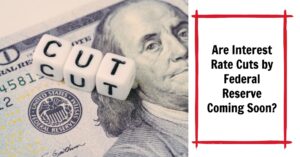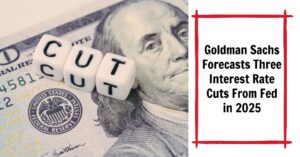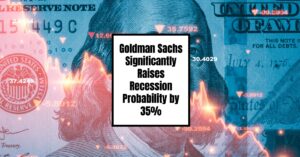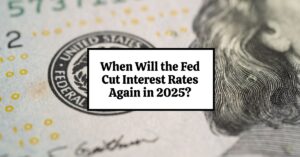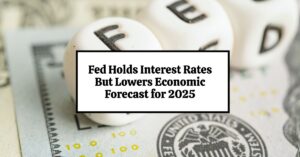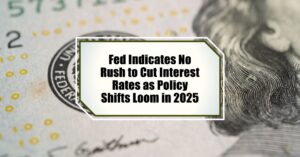Interest rate cuts are likely on the horizon for 2025. The Federal Reserve has already started easing monetary policy in 2024 and is expected to continue down this path in 2025 to further bring the federal funds rate down to a range of 3.75%-4.00% by year-end.
It's like this: the economy has been walking a tightrope for a while now. The Fed has been carefully adjusting the balance, trying to keep inflation under control without causing a stumble that leads to a recession. But, given the state of things, it's probable that they'll ease off the breaks by cutting interest rates in the coming months.
Are Interest Rate Cuts by Federal Reserve Coming Soon?
The Current Economic Situation: A Tricky Balancing Act
Let's be real, things are a bit murky right now. As we move into April 2025, the US economy is showing a mixed bag of signals.
- GDP Growth: The Fed is projecting a 1.7% GDP growth for this year, which isn't terrible, but it's definitely a step down from earlier predictions. It is a sign that the economy is slowing down a bit.
- Unemployment: The unemployment rate is expected to creep up to 4.4%. That's still relatively low, but it suggests that the job market is beginning to cool off.
- Inflation: This is the big one. The Personal Consumption Expenditures (PCE) index, a key measure of inflation, is at 2.7%. The core PCE is at 2.8%. Both of these are above the Fed’s target of 2%. However, the good news is that they are both showing signs of calming down.
| Economic Indicator | Current (April 2025) | Projected (End of 2025) | Source |
|---|---|---|---|
| Federal Funds Rate | 4.25%-4.5% | 3.75%-4.00% | FOMC Projections |
| Real GDP Growth | ~2.0% (2024) | 1.7% | FOMC Projections |
| Unemployment Rate | ~4.0% | 4.4% | FOMC Projections |
| PCE Inflation | 2.7% | 2.7% | FOMC Projections |
| Core PCE Inflation | 2.8% | 2.8% | FOMC Projections |
The Trump Tariff Wildcard
Now, here's where things get even more interesting and uncertain. Former President Trump's tariff policies are throwing a wrench into the gears. These tariffs, designed to protect American industries, are actually pushing up prices on imported goods. As a result, trading partners are firing back with their own tariffs. This can lead to a slowdown in economic activity and even more inflation.
The Fed itself has acknowledged this, stating that the economic outlook is increasingly uncertain because of these trade policies.
What the Fed is Saying (and Doing)
So, what's the Fed's game plan? At their meeting back in March, they decided to hold the federal funds rate steady at 4.25%-4.5%. This comes after three rate cuts in 2024. The members of the Federal Open Market Committee (FOMC) are currently expecting two more cuts to happen this year.
The thing about the Fed is that they are trying to balance two things:
- Maximum employment: They want as many people as possible to have jobs.
- Price stability: They want to keep inflation under control.
Fed Chair Jerome Powell has emphasized that they're ready to adjust their approach based on what the economic data tells them. If the economy stays strong and inflation doesn't fall to 2%, they'll keep things as is. But if the job market weakens or inflation drops faster than expected, they are going to ease up on policy accordingly.
They've also announced plans to slow down quantitative tightening starting in April, which basically means they're easing up on their efforts to shrink the money supply.
All of this boils down to a wait-and-see approach. The Fed is going to watch the data closely and make decisions based on what they see.
The Market's Bets: A Different Story?
Here's where it gets interesting. While the Fed is projecting two rate cuts, the financial markets are expecting more aggressive action. As of early April, traders in the futures market are betting on the Fed starting to cut rates as soon as June. They're also predicting a total of three 25 basis point cuts by the end of the year.
Why the difference in opinion? Well, the markets are seemingly factoring in a more pessimistic outlook. They are seemingly more concerned about tariffs potentially leading to higher inflation and slower growth, which would force the Fed to cut rates earlier and more aggressively.
What's Going to Determine the Rate Cuts?
So, what are the factors that will ultimately decide when and how much the Fed cuts rates?
- Inflation: If inflation keeps falling, it gives the Fed room to cut rates. But if tariffs cause prices to rise, it could throw a wrench into the works.
- Economic Growth: If the economy slows down further, it could push the Fed to cut rates to stimulate demand. However, if the economy stays strong, the Fed might hold off to prevent things from overheating.
- Tariff Policies: This is a big unknown. Tariffs could drive up inflation while also slowing down economic activity. The Fed's response will depend on how these policies actually play out.
- Global Economic Conditions: Weakness in other major economies could hurt US exports and slow down growth, potentially leading the Fed to cut rates.
What This Means for You: Borrowing Costs and the Housing Market
Lower interest rates generally mean lower borrowing costs. That could make loans for things like homes, cars, and businesses more affordable. For homeowners, it could translate to lower mortgage rates.
However, it's important to remember that the relationship between the federal funds rate and mortgage rates isn't always direct. Mortgage rates are influenced by a lot of other factors, such as long-term bond yields, investor expectations, and inflation forecasts. So, even if the Fed cuts rates, mortgage rates might not drop significantly.
A lot of the expected rate cuts are already priced into the bond market, so we might not see a huge change in mortgage rates even if the Fed actually does cut rates. Also, if inflation expectations remain high because of tariffs, long-term rates could stay elevated.
In conclusion, lower rates can have a positive effect on the market, but it is only one contributing factor, and the effect can also be mitigated if other things are not in sync.
My Two Cents
Honestly, trying to predict the Fed's next move is like trying to predict the weather. There are so many factors at play, and things can change quickly.
Personally, I think the Fed is going to be very cautious. They don't want to make the mistake of cutting rates too early and then having to reverse course if inflation starts to rise again. This could cause damage to their credibility.
I'd also wager that the markets are too pessimistic in their predictions. While a recession is certainly possible, I don't think it's as likely as the markets seem to be pricing in.
The Bottom Line
So, are interest rate cuts coming soon? Yes, most likely. The Federal Reserve is expected to cut interest rates sometime in 2025. However, the timing and the amount of the cuts is still uncertain because of factors such as inflation, economic growth, and tariff policies. Keep an eye on the economic data and listen to what the Fed is saying. I am confident that we will get more hints in the coming months.
Work With Norada in 2025
Discover high-quality, ready-to-rent properties designed to deliver consistent returns—even in times of economic uncertainty.
With the Federal Reserve holding interest rates steady, now is the time to secure property investments before potential rate cuts shift the market.
Speak to our expert counselors (No Obligation):
(800) 611-3060
Read More:
- Goldman Sachs Forecasts 3 Interest Rate Cuts From Fed in 2025
- 2008 Crash Forecaster Warns of DOGE Triggering Economic Downturn
- Stock Market Predictions 2025: Will the Bull Run Continue?
- Goldman Sachs Significantly Raises Recession Probability by 35%
- Stock Market Crash: Nasdaq 100 Tanks 3.5% Amid AI Concerns
- Stock Market Crash Prediction With Huge Discounts on Bitcoin, Gold, Houses
- S&P 500 Forecast for the Next Year: What to Expect in 2025?
- Stock Market Predictions for the Next 5 Years
- Billionaire Warns of Stock Market Crash If Harris Wins Elections
- Stock Market is Predicted to Surge Regardless of the Election Outcome
- Echoes of 1987: Is Today’s Stock Market Crash Leading to a Recession?
- Is the Bull Market Over? What History Says About the Stock Market Crash
- Wall Street Bear Predicts a Historic Stock Market Crash Like 1929
- Economist Predicts Stock Market Crash Worse Than 2008 Crisis
- Stock Market Forecast Next 6 Months
- Next Stock Market Crash Prediction: Is a Crash Coming Soon?
- Stock Market Crash: 30% Correction Predicted by Top Forecaster
